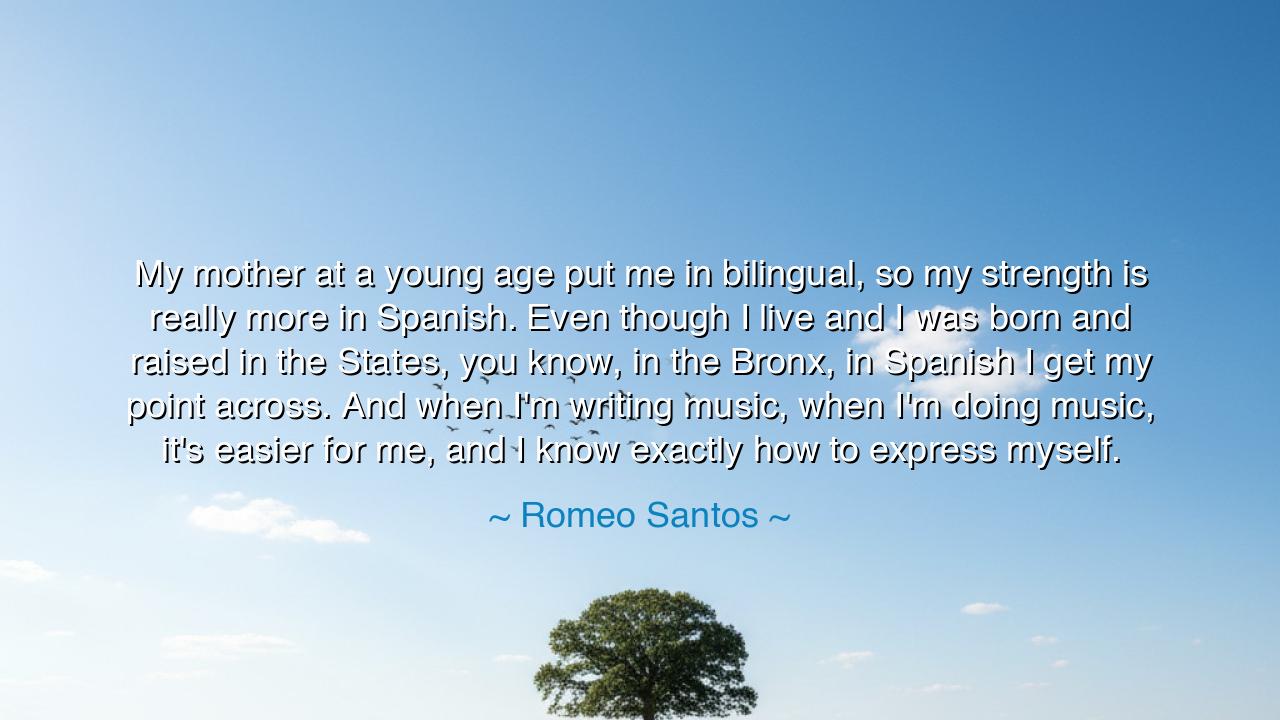
My mother at a young age put me in bilingual, so my strength is
My mother at a young age put me in bilingual, so my strength is really more in Spanish. Even though I live and I was born and raised in the States, you know, in the Bronx, in Spanish I get my point across. And when I'm writing music, when I'm doing music, it's easier for me, and I know exactly how to express myself.






When Romeo Santos said, “My mother at a young age put me in bilingual, so my strength is really more in Spanish. Even though I live and I was born and raised in the States, you know, in the Bronx, in Spanish I get my point across. And when I'm writing music, when I'm doing music, it's easier for me, and I know exactly how to express myself,” he was not merely describing a linguistic preference — he was expressing the spiritual power of language as identity. His words speak of belonging and expression, of the eternal bond between a person’s tongue and their soul. In this reflection, Santos honors the inheritance of culture, the bridge between two worlds that shaped his art: the English-speaking world that raised him and the Spanish-speaking world that gave him his voice.
In his statement lies the profound truth that language is more than words — it is memory, music, and blood. To think and speak in Spanish, for Santos, is to inhabit his roots — the rhythms, the warmth, and the emotions that pulse through his heritage. Though born in the Bronx, his spirit carries the cadence of the Caribbean and the soul of Latin America. Spanish, to him, is not a barrier but a vessel — the medium through which his deepest emotions find their most honest expression. When he says that in Spanish he knows “exactly how to express” himself, he is confessing that language and identity are inseparable, that one’s truest art is born in the language of the heart.
This understanding is ancient. Across centuries, poets and thinkers have known that language carries not only meaning but spirit. The Greeks believed that each language revealed a different way of seeing the world; the Persians believed that poetry in one’s native tongue was a prayer that reached the heavens. In the same way, Romeo Santos, the “King of Bachata,” finds his music intertwined with the sound of Spanish — the tongue of passion, longing, and poetry. It is not merely his mode of communication but his instrument of feeling. To sing in Spanish is to let the heart speak without translation.
The origin of this quote lies in Santos’s reflections on his life and career — a life lived between cultures, between English-speaking America and the Spanish-speaking Caribbean. As a child of Dominican and Puerto Rican parents, he grew up hearing both tongues, yet it was Spanish that carried the music of his ancestors. It shaped not only his art but his understanding of emotion. His mother’s decision to raise him bilingually was not just an educational choice; it was an act of preservation — ensuring that her son would never lose the rhythm of his roots, even as he grew within a different land. Through this, Santos became what the ancients might call a “bridge-person,” one who unites worlds through the harmony of voice.
We can see a similar story in the life of Pablo Neruda, the Chilean poet whose verses in Spanish captured the universal language of love and sorrow. Though his words have been translated into every major tongue, they lose something in the transition — the tenderness of their native rhythm, the pulse that comes only from speaking from within one’s own culture. So too with Santos: though his music may reach global audiences, its soul remains unmistakably Latin, inseparable from the melody of Spanish. The power of his art lies in that authenticity — in the refusal to abandon the voice that shaped him, even as the world tempts him to conform.
His quote also carries a quiet lesson about belonging in two worlds. For many who live between languages — between origins and destinations — there is often a struggle to define oneself. Yet Santos shows that one need not choose. To be bilingual is not to be divided, but to be enriched. His mother’s wisdom gave him not one world, but two — the precision of English and the poetry of Spanish. Yet he recognizes where his strength lies: in the language that lets him feel rather than translate, in the tongue that sings naturally from within. This is a lesson for all who seek authenticity: that the truest expression of self lies not in what the world expects of you, but in what your soul knows how to say.
And so, let this teaching endure: Never abandon the language that makes your heart sing. For language is the thread that ties you to your people, your ancestors, and your inner truth. Whether it is the words of your childhood, the songs of your homeland, or the dialect of your dreams, cherish it — for within it lies your freedom. Like Romeo Santos, let your art — whatever form it takes — flow from the voice that feels most alive within you. For it is there, in the language of your roots, that your truest self will always be found — strong, clear, and eternal.






AAdministratorAdministrator
Welcome, honored guests. Please leave a comment, we will respond soon